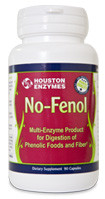- Home
- Products by Manufacturer
- No-Fenol SCD
Product Description
- Better breakdown of fruits and vegetables
- Digests phenols
- Tends to soften stools
- Available in chewables
No-Fenol was developed by Dr. Devin Houston in response to parents' request for a product that would allow their children to eat fruits and vegetables without the problems thought to be associated with polyphenolic compounds. Initial response from many parents indicate that for many, No-Fenol does allow the addition of these foods to the diet without complications.
All plants contain some degree of phenolic compounds. The phenol structure itself is ubiquitous in nature, and is actually essential to many of life's processes. Current thinking by many is that some subset of children on the PDD spectrum have difficulty in the processing of phenolic compounds, which may present as behavioral problems and physical symptoms such as red ears and cheeks, and dark circles under the eyes. While the basic mechanism behind this phenomenon is not well defined, it is thought that perhaps the phenolic compounds become "trapped" in some part of a metabolic cycle, presumbably involved with various detoxification pathways.
The research literature indicates that some phenolic compounds are modified by the addition of carbohydrate groups to their structures, which may inhibit their crossing into cells and being metabolized. The current hypothesis for why No-Fenol may help is through the ability of the enzymes in this product to remove the carbohydrate groups from the phenols, thus allowing normal processing by the detoxification pathways. There is no evidence that No-Fenol directly modifies phenolic structures. Indeed, the success of No-Fenol in allowing the addition of phenolic foods back into the diet of children with PDD may result in a re-evaluation of the basis of the phenol "problem".
Xylanase is the major component of No-Fenol, and is an enzyme used to breakdown the structural components of plant cell walls, which are primarily very complex carbohydrates. Xylanase is used in the juice industry to extract more juice from fruit pulp fibers. At least one reference indicates that polyphenolic compounds are actually increased by treatment with xylanase. Based on this reference and the fact that No-Fenol has allowed "phenol-sensitive" individuals to ingest phenolic foods, HNI now believes that the phenol issue is much more complex than previously thought, and may not be due so much to the presence of phenols as to the specific structure of these phenols.
Fillers
No-Fenol capsules can be purchased with either rice bran or cellulose/medium-chain triglyceride oil (MCT oil) as fillers. The amount of filler used in either product is about 35 mg. Rice bran is digestible whereas cellulose is not. MCT oil is derived from coconut, and the cellulose is derived from European Spruce trees. The capsule is also cellulose. No-Fenol powder contains cellulose and medium chain triglycerides. There is more filler per serving in the bulk powdered formulation to enable accurate measurement of the powder.
No-Fenol is recommended primarily for those with known sensitivities to phenolic compounds.
Store in a cool, dry place away from direct light and humid conditions. Do not refrigerate, keep at room temperature. Cold does not harm the enzymes, but most refrigerators are high-humidity environments. Freezing is acceptable and encouraged for long-term storage.
These statements have not been evaluated by the Food & Drug Administration. This product is not intended to diagnose, treat, cure or prevent any disease.
 Loading... Please wait...
Loading... Please wait...


